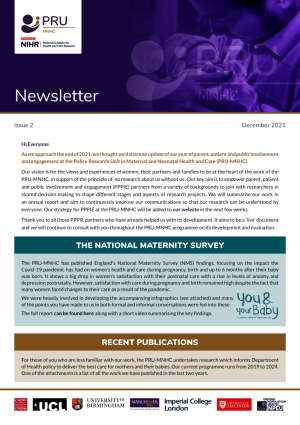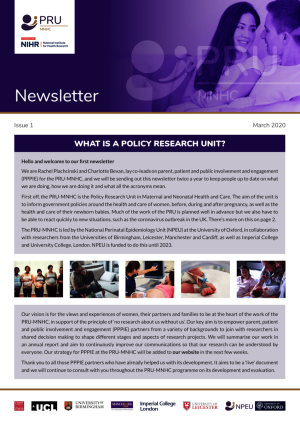Parents' priorities in research

Published on Wednesday, 02 June 2021
How do we make sure parents' voices and priorities feed into our research priorities? We spoke to Professor Jenny Kurinczuk, head of the Policy Research Unit, to find out more about the development of our research programme.
The Policy Research Unit in Maternal and Neonatal Health and Care was set up to make sure government decisions about maternity and neonatal care policy are based on good quality evidence. So our research themes and projects reflect areas of interest for the Department of Health – but this doesn't mean that parents' concerns aren't important.
Every year we host an event for parents and organisations interested in pregnancy, birth and early parenthood. We share and answer questions about our latest research, and our guests tell us about the problems and questions that keep coming up in their work (you can read about our last event here).
Prof Jenny Kurinczuk (Director of the Policy Research Unit) and Prof Fiona Alderdice (Deputy Director), then take a summary of these discussions to meetings with our Oversight Group, along with our recent research findings, the findings from other research and suggestions from our research team. The Oversight Group includes representatives from the Department of Health, NHS England, NHS Improvement and Public Health England, and members contribute a high-level perspective – things like the long term plan for NHS England and findings from the Ockenden report into failings at Shrewsbury and Telford NHS Trust. All these different perspectives are considered when they advise on our programme of work, and Jenny says the views of parents are extremely important in their discussions.
One example is the Listening to Parents project. This was suggested by Sands, the stillbirth and neonatal death charity, as parents whose baby has died aren't included in the general National Maternity Survey so their experiences of maternity care aren't included in the public record.
Another route feeding into our work is through ministerial or parliamentary questions, especially when an issue keeps being raised.
Jenny added: “There was an issue at one point about doulas, so the Oversight Group came to us and asked: 'What can you tell us about doulas?' So we reviewed all the published research about doulas to get an idea about the impact they have on maternity care.
“That review helped identify gaps in the research evidence, which we pointed out to the Oversight Group and asked if they wanted us to do qualitative research to fill those gaps. We then interviewed mothers who had been supported by a volunteer doula, and volunteer doulas working in community organisations, to understand how doula support works for women alongside maternity care. You can read the papers we published about this work in Midwifery and BMC Pregnancy and Childbirth.”
In general parents looking to get more research done on a particular topic have three more options: approaching individual researchers working in that area; getting involved with a charity or organisation that knows how to lobby government, or submitting questions to government committees such as the Health and Social Care Committee.
Jenny says: “Putting in a submission to the Health and Social Care Committee, or another committee looking at your area of interest, can be useful, even if your issue isn't directly relevant to the questions they are consulting about – each submission has to be read by members and incorporated into their report. So it's always worth having a go as you don't know who's going to read what you send and take note of the submissions.”


